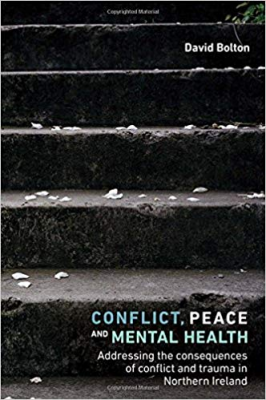Book: Conflict Peace and Mental Health: Assessing consequences of conflict and trauma in Northern Ireland

This is a timely book to remind us what happens when we don't nourish peace or build public infrastructures to ensure that violence and injustice cannot succeed. It is timely not only because of recent events in Northern Ireland that might evoke divisions from the past, but also because of recent events in London and Manchester, hate crime, and the shortcomings of democratic voting- not to mention also the importance of looking now at the intergenerational problems that await the people in Syria and other Middle East countries.
Throughout the recent visit by the Pope to Ireland we heard little about what can be done to address trauma - we did not get much beyond the blame game, and the pointing fingers. We heard little of what we have learnt about psychological interventions to deal with trauma - and child abuse falls under the umbrella of trauma - and we heard nothing about how communities practically go about helping each other grow and work together to address the ravages of mental illness that follow upon civil violence whatever your religious beliefs and allegiance.
Of course, one can say 'man up' and other words of denial, and minimisation, but mental illness needs to be faced squarely, and given the parity with physical health that politicians tell us it already has in our shaming society.
This book starts with the devastation of the Omagh bombing and the response of the locals to it. I remember a friend of mine saying at the time that Omagh was chosen by the Real IRA and Continuity IRA because it was here that most people of different perspectives voted in favour of the Good Friday agreement. This book is testimony to the cohesiveness and resilience of the various parts of that community in addressing what could have destroyed it. Chapter 2 describes the establishment of The Omagh Community Trauma and Recovery Team; Chapter 3 assesses the Mental Health Impact of the Omagh bombing following on the 2 questions asked by Mo Mowlam - what would be the human impact and what should be done to address the needs of the people affected; Chapter 6 is devoted to The Northern Ireland Centre for Trauma and Transformation: and a description of what is a comprehensive trauma centre. Chapter 7 goes into greater detail about the development of a trauma focused therapy programme. Chapter 8 looks at what constitutes trauma focused skills training for practitioners. Most importantly, Chapters 9 and 10 evaluate the need for research, advocacy and policy support along with learning from the lessons of Omagh in addressing future conflict and trauma and the experience and pain of loss and trauma.
Chapters 4 and 5 give a history of the Troubles between 1969-1999 and 2000-2015 and the growing awareness of how they have affected the mental health of children, adolescents and adults. Page 92 references the work of O'Neil et al (2015) who concluded that whilst people in Northern Ireland have not suffered long term problems linked to the Troubles, 15 per cent of adults in Northern Ireland have mental health difficulties associated with civil violence. Page 56 details the types of study and research undertaken early on. Pages 47-48 detail the Children and Adolescent studies carried out as part of the evidence-based approach taken.
Chapters 4 and 5 are of particular interest in that they highlight how in the early period (because the concept of PTSD was still being developed) little state or individual attention was given to the impact of violence on the mental health of the population. As both the methodology and data gathering sharpened up, 'it has become more evident that the experience of injustice by a particular generation can, if not addressed or resolved, be passed on to the next generation to produce a range of social and psychological pathologies such as self-harm, suicide, anti-social behaviour, and ongoing interpersonal violence.' (page 91 referring to work by the Irish Peace Centres). These chapters draw attention to the impact that 'conflict ridden violence, consequential mental health problems, and other socio-economic and social stressors have had on the parenting of children'. The research has pointed up how parenting is affected when 'violence is an expected part of life and the world is seen as an unsafe place with parents becoming hyper-protective of their children and reluctant to discuss violence or their own personal experiences' (page 91-92 referring to the work of Hanna et al 2012 and O'Neill et al 2015). As well as contributing to anxiety, hypervigilance and depression in the younger generation the research indicates the need to be aware of the impact on the developing child in terms of attachment, emotional competence, self-regulation, social skills and other capabilities.
As a result, closer attention to family, and systemic interventions have been advocated as being a more systematic approach to prevent violence, mental health, and substance abuse continuing in an intergenerational cycle. Finally, the research has noted how the suicide rate in Northern Ireland has risen as time has gone by and more so after the Peace settlement has been put in place. This is linked with the internalisation of what used to be external violence, and the loss of identity experienced by many who used to be able to define themselves by concepts as basic as 'throwing stones'.
From a developmental and educational point of view there is much to consider in this book, not least the old chestnut of how Health and Education can work together in enabling children to understand what it means to be physically and mentally well within a community especially in the face of community conflict, division and violence arising. Systemic approaches addressing conflict resolution and community violence as well as a mental health service that is evidence based, informed by research and structurally available across communities is proposed as the way to prevent a repetition of old ways. Looking to the future one may ask what is being done to pass on what has been learnt in Northern Ireland in Syria? Although the book was not designed to specifically address the consequences of sexual abuse it does raise awareness of the need to talk psychologically about abuse, to get real about the effects of abuse within families and society, to reduce the risks of abuse as well as promote resilience in the face of all abuse.
Several layers of training people in understanding the impact of trauma on communities as well as individuals are set out. Reference is made to the important role from the beginning that the Education authority, teachers and educational psychologists played in addressing the impact of trauma and violence. It is perhaps for another book to describe the detail, materials and practicalities of this work.
As for ongoing work, moving the peace process forward, and maintaining structures that do this, can one look for mandatory courses on attachment, child development and parenting in schools and parishes as part of the core national curriculum? One has to ask what may happen if the research and comprehensive thought set out in this book is not captured in the funding and structures of Northern Ireland as well as the rest of England.
Conflict Peace and Mental Health: Assessing the consequences of conflict and trauma in Northern Ireland by David Bolton,
Manchester University Press 2017, Hardcover; 232 pp; £75, ISBN 978-1-5261-2667-2
The reviewer, Dr Derek Indoe, is a Consultant Clinical and Forensic Psychologist ( C.Psychol Ed, Couns, For, Clin)


















